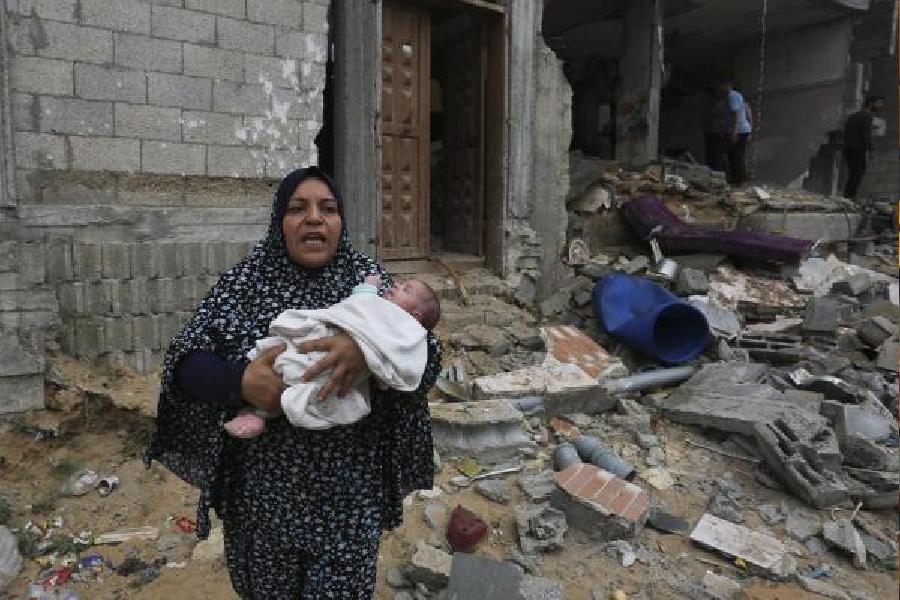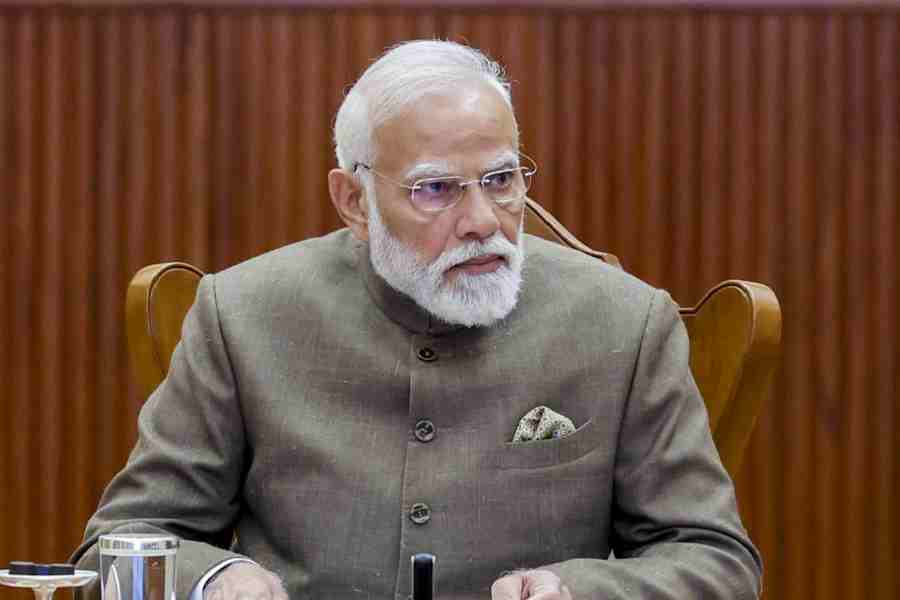Nayrouz Qarmout, a Palestinian author who lives in the Gaza Strip, recalled that during past wars with Israel, Gazans would feel extreme pangs of fear when they heard explosions, but afterwards hope would return. Hope of cease-fires, and of life going on.
But this war is different.
Gaza residents say the bombs come mostly without warning and hit indiscriminately, leading to widespread hopelessness and the feeling that imminent death is inevitable.
“You can’t imagine the feeling,” she said. “You are not safe. All places are targets, so you think of dying at any time.”
Israeli airstrikes have pounded the enclave for three weeks in response to the October 7 attack on Israel by Hamas, the armed Palestinian group that rules Gaza, in which more than 1,400 people were killed, Israeli authorities say.
The Israeli military has since launched more than 7,000 airstrikes on the densely packed coastal strip, which is home to more than two million Palestinians. More than 7,700 people have been killed by the strikes, according to the Hamas-run Gaza health ministry, among them at least 3,195 children.
The death toll of a war that appears far from over has already dwarfed the bloodiest of Gaza conflicts of the past 15 years.
Overnight amid some of the most intense Israeli airstrikes of the past three weeks, that fear reached a fever pitch after phone and Internet lines were severed, causing an information blackout that heightened panic.
The Palestinian communication companies said Israeli airstrikes cut nearly all phone and Internet connections in Gaza before the bombardment intensified. The Israeli military declined to comment.
Residents huddled in homes and shelters — some no more than a tent — not knowing who was being struck.
“This is the most terrifying night I ever experienced in my life,” a Gaza journalist, Hind Khoudary, posted on the platform X, formerly Twitter.
And many in Gaza fear that if they aren’t killed by an airstrike, they might die of hunger or thirst because of the Israeli siege that has caused severe shortages of water, food, fuel and other essentials.
Olfat al-Kurd, a field researcher in Gaza for the Israeli human rights organisation B’Tselem, said some 70 of her relatives have been killed by Israeli airstrikes since the war began. As each day brings news of another friend, relative or neighbour killed — or sometimes an entire group of them at once — the climate of fear and death grows, she said.
“The war currently being waged on Gaza is, in effect, against the civilians. They don’t distinguish between combatants and civilians,” al-Kurd said, speaking from a tent encampment in the southern Gaza city of Khan Younis, where her family fled after Israel called on all residents to evacuate northern Gaza before an expected ground invasion.
“So you feel like your turn is coming. We are living the last of our days,” she added. “We are just waiting our turn.”
Israel has said its aim is to remove Hamas from power and eradicate the armed group. Israeli officials say they are striking only sites connected with Hamas, including the homes of members. The military says it does not target civilians but has also acknowledged that warnings to civilians have not been as extensive or specific as they have been in past wars.
“This is not like previous rounds,” Daniel Hagari, an Israeli military spokesman, said in a briefing in the early days of the war.
Since the Israeli airstrikes began, Gazans have said they feel nowhere is safe. The strikes have flattened mosques, struck hospitals and schools and demolished homes with families inside without warning.
When he hears a rocket approaching, it feels as if it’s coming directly for him, said Mosab Abu Toha, a poet, an essayist and the founder of the Edward Said Library in Gaza.
“Those who were killed and had someone to bury them are the lucky ones. Who knows if anyone will bury us,” he said. “These feelings reflect the state of fear and defeat and despair caused by Israel’s barbaric airstrikes.”
On October 13, Israel warned more than a million Palestinians to evacuate their homes in northern Gaza and move south. But those who fled found that the south, too, was perilous as Israel kept up airstrikes on the area.
On the first day of the war, Kurd said, she fled her home in the northern section of Gaza City and went to stay with family in another part of the city for four days. But the airstrikes hit around them.
They went to Al Shifa Hospital in Gaza City where for three days, she stayed with her husband and four children in the hallway. From a window, she said, she watched a constant stream of dead and wounded being rushed into the hospital.
A week ago, the family went to Khan Younis, where Israeli airstrikes continued to rain down.
“They say: ‘Go to a safe place.’ But then they strike the place they told us to flee to,” Kurd said. “This is intentional. There’s no mercy and it’s massacre after massacre and the world is just watching it happen.”
When they hear Israeli fighter jets overhead, some utter the Muslim proclamation of faith and give their loved ones around them what could be a farewell kiss. Children have taken to writing their names on their hands or arms, so if they are killed, their bodies will be identified and not buried in the mass graves for unidentified bodies.
Other people have posted last testaments on social media, seeking to settle any debts or unresolved disputes and asking people for forgiveness to clean the slate in case they die.
This week the UN secretary general, António Guterres, said the “appalling attacks by Hamas” on Israel could not justify “collective punishment of the Palestinian people”, adding that he was concerned about clear violations of international humanitarian law.
“The relentless bombardment of Gaza by Israeli forces, the level of civilian casualties, and the wholesale destruction of neighbourhoods continue to mount and are deeply alarming,” Guterres said. “Protecting civilians does not mean ordering more than one million people to evacuate to the south,” he added. “And then continuing to bomb the south itself.”
William Schomburg, the head of the International Commission of the Red Cross mission in Gaza, said that of all the many conflicts that Gazans have lived through, the current situation is “exponentially more difficult”.
Gazan friends and colleagues have told him that the sense of hopelessness, fear and uncertainty felt now was unparalleled.
“When this conflict ends,” he said, “those invisible wounds, those scars, the trauma that will come from this, that impacts young and old alike will tragically be felt for a very long time.”










